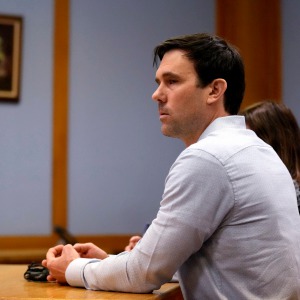Column: Between bok choi and baseball
| Published: 03-27-2023 11:36 AM |
Who doesn’t feel at least a little discomfort reading a book that messes with time? Film can have the same effect, or a series you are streaming when it’s not clear if something is happening now or in the past or future. Disorientation can be intriguing, but it’s also stressful. Novelists and filmmakers have restless imaginations, and some of them monkey with time to get truths they cannot develop with linear narratives. Sometimes they provide subtle clues in their unannounced flashbacks — hair length or an iconic car from 1957 — but not always; and we all have our thresholds for these shenanigans, that point where we close the book in anger or reach for the remote.
What puzzles me is why we, particularly people of my generation, are not more patient with the liberties these artists take? If you think about it, your own mind wanders all over the place without any regard for time. You could be stirring vegetables in a wok or trying to make sense of a paragraph written by Emanuel Kant, and your mind makes a sudden jump, not logically to the philosopher you read just before you got to Kant, not into your vocabulary for the right word to describe aroma kicked up by the sizzling the bok choi, but to a baseball game you played as a boy. Without warning and without a transition, you are on a field in Massachusetts trying to hit a pitch you missed more than half a century ago. These time skips happen randomly, but not always; we can also will them in a psychic search a little like googling.
Then with all this practice, why do we feel so disoriented when books, films, and plays reorder chronological time? Our expectations for clarity are impossibly high when we open a book or tee up a series or take our seat in a theater because we have been conditioned by conventions that have organized story-telling for centuries. Here is a conversation my wife and I have not infrequently when we are streaming:
SHE: Who is that man? Have we seen him before?
HE: Not yet. We’ll find out.
These questions have nothing to do with intelligence or hipness; they are about her comfort zone.
And this brings me to the awkward realization that people of my generation (by this I mean people born between the mid-’30s and the mid-’50s) are probably less agile with artistic time shifts than the generations who followed and now out-number us are. Look at the sensation around “Everything Everywhere All at Once,” the film so broadly honored at the 2023 Oscars. I’ll confess the conversation between my wife and me while we watched it a couple months ago was more complicated than the one modeled above. We eventually quit, and now we are embarrassed at our impatience.
We oldsters are better prepared for time shifts than we think. Didn’t we read Joyce’s “A Portrait of the Artist as a Young Man” and Faulkner’s “The Sound and the Fury” when we were in high school? Both open with pages that are impossible to understand, and we plowed through in good faith until we got some bearings, then returned to the beginnings for a second look. Didn’t we grow up reading Virginia Woolf? Maybe I misremember. My high school experience is a bit of a blur because I spent more than half of my life there, first as a student and then as teacher. Over 47 years I saw a remarkable change in curriculum, and if I’m looking for accuracy, my generation is more likely to have read Hardy, Dickens, and Eliot (alas, George, not T.S.) in high school and to have encountered Joyce, Faulkner, and Woolf only in college, if at all. When I started teaching in the late ’60s, schools were reinventing themselves to deal with rebellious students. Yes, we taught Shakespeare, Woolf, Joyce, and Faulkner, but we added the less traditional voices of Heller, Vonnegut, Plath, and Kesey, then writers of color like Toni Morrison, Leslie Marmon Silko, Alice Walker and many, many others. The transformation was remarkable; no wonder the generations that followed us are better suited for artists who rearrange time. Another thing: our generation did not grow up with: video games. We may know something about avatars, alternate realities, and parallel universes; but we are not native speakers.
Article continues after...
Yesterday's Most Read Articles
 Hartland voters successfully petition for school budget revote
Hartland voters successfully petition for school budget revote
 JAG Productions announces closure, citing ‘crisis facing the arts’
JAG Productions announces closure, citing ‘crisis facing the arts’
 Hanover’s Perreard may soon capture the attention of collegiate coaches in two athletic pursuits
Hanover’s Perreard may soon capture the attention of collegiate coaches in two athletic pursuits
I still believe that we could be more comfortable than we are with artistic time shifts if we just recognize that our minds and our daily behavior experience them every waking hour of the day. Most of our confusion comes when we demand narrative convention, storytelling that begins “once upon a time” and proceeds forward in a straight line to a conclusion. But how interesting is a steady diet of Cream of Wheat? I prefer artists who are so interested in human psychology that they have to break conventions to get at the deeper truths.

 Editorial: Parker parole a reminder of how violence reshapes our lives
Editorial: Parker parole a reminder of how violence reshapes our lives Editorial: Chris Sununu’s moral vacuum
Editorial: Chris Sununu’s moral vacuum Editorial: Gambling tarnishes America’s sporting life
Editorial: Gambling tarnishes America’s sporting life By the Way: A white nationalist’s many mistruths
By the Way: A white nationalist’s many mistruths
